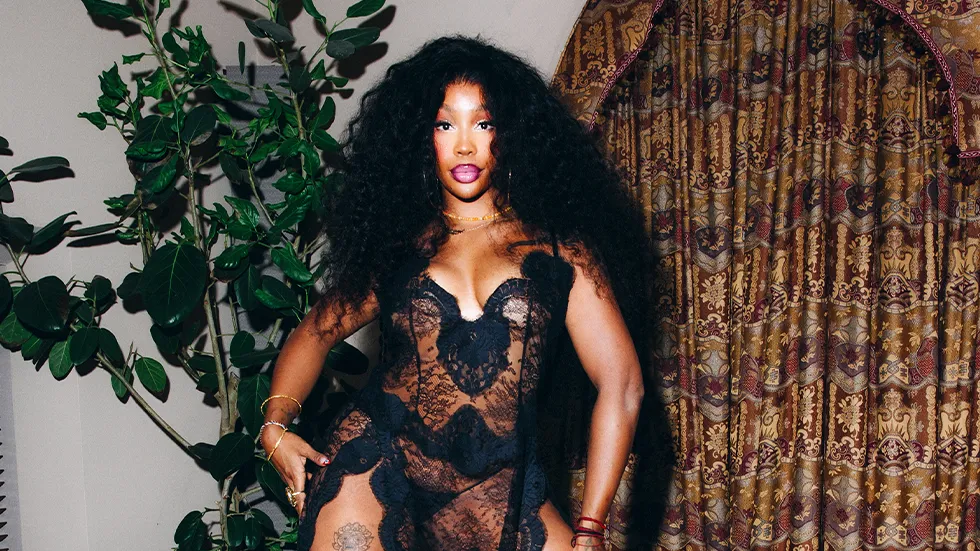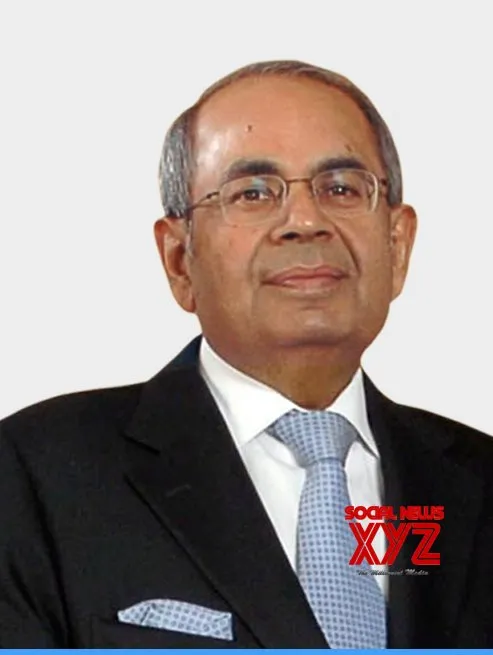Copyright gq

It’s been about a month and a half since the singer returned home to Los Angeles after wrapping her first international co-headlining stadium tour. It was the capper to an exemplary 2025 that included costarring in her first feature film and a single that spent 13 consecutive weeks at the top spot on the Billboard Hot 100—a run that began shortly after she appeared in February’s Super Bowl halftime show. She’s been in go mode for the majority of the year. How then, after finally coming off the road in August, did she downshift and decompress? She didn’t, and therein lies where she fucked up. “I had no comedown,” SZA, born Solána Imani Rowe, says in a tone that registers as half-amused, half-disappointed in herself. “I came back and I just went right into some bullshit. I don’t know why I’m back in the studio making a whole other album, just doing a whole bunch of shit. Spending time outside of my house for days at a time. I feel so frazzled.” Nighttime is falling over Burbank as SZA—in comfy blue track pants, red curls blanketing her face, the first of several joints she will smoke tonight nestled between her fingers—settles into a plush sectional at her recording studio. Walking through an arched door and into the oasis of the studio is akin to passing through one of those secret doors in Narnia. Outside, it’s an otherwise drab block surrounded by warehouses and storage facilities, but once you step over the threshold you may as well be in paradise: Wood-paneled walls, walkways adorned with greenery, and ’70s soul playing softly come together to create tranquility and stillness. Despite the quiet, you can still feel the industriousness of the space: Lattes and ginger teas for late-night sessions are being brewed; musicians materialize to work out a guitar melody in the common room before disappearing back into the booth. Beyond a couple more gates is the studio room that has been SZA’s home away from home when she’s not getting into pointedly undefined “bullshit.” Recording sessions notwithstanding, she has no immediate plans to release another album anytime soon, maybe not even in 2026 at all. But she wanted to meet here because this is just where she is these days, seeking respite from that frazzled energy—or, more likely, harnessing it—and trying to figure out what comes next after the biggest year in her career. “It feels like the culmination of everything—everything I’ve worked towards in my career in one year,” SZA says, pensively, of 2025, a year in which she neither released nor promoted an entirely new record. “It didn’t come after I dropped an album, so it felt weird. I didn’t know how to place it. I’m like, Why am I getting these accolades? What’s going on? It was just so random. But I’m still grateful. I’m just trying to process it.” Internal emotional discombobulation aside, SZA’s energy in conversation tonight—reflective, playfully self-deprecating, hyperaware of public perceptions and narratives around her—matches the serenity of the studio. Maybe that’s because she can see the light at the end of the tunnel, even if she has no clue where it leads yet. In the midst of all this uncertainty, a new sense of creative focus is emerging from these fruitful sessions. “I think I’m just in a transition period where I’m leveling into a new section of who I am as a person. And that requires whatever the fuck this weird-ass vibe is right now inside,” SZA tells me. “It’s time to shake. I don’t know what I’m shaking or where I’m shaking to, but it is time to shake. I can feel it.” Like one of the insects in the bug-world fantasia on display in her live show, SZA is in the early throes of metamorphosis. But who is she becoming? SZA’s place in the contemporary pop-culture pantheon is that of a modern-day bard and distinct R&B-pop-soul-blues-grunge hybrid: Throw Lauryn Hill, Avril Lavigne, Björk, Ashanti, and a handful of other ’90s and aughts icons into a DNA recombinator and you get SZA, our foremost translator of millennial angst. Her songs are unflinchingly honest and specific—“I fuck him ’cause I miss you,” goes the chorus of “F2F”—and yet that specificity is exactly what makes them so widely relatable. Lately, she’s parlayed that status into new records broken, new chart stats achieved, plus five Grammys and a project’s worth of cutting-floor bonus songs so well-reviewed and cohesive that it could reasonably be taken as her third album. (She’s adamant that it shouldn’t be.) But nobody holds SZA to a higher standard than SZA. Compliment her on a new frontier, like her acting debut in One of Them Days, the buddy comedy where she acquits herself quite nicely alongside a maestro like Keke Palmer, and she can’t help but downplay it. “I thought it was finna be on…not Tubi, but something like that, not be in theaters,” she says. And the Grand National Tour with Kendrick Lamar, where she had sold-out stadium crowds in the palm of her hand? It gets a shrug: “Just try hard shit, get embarrassed, fumble, and then try to do a better job next time, I guess.” SZA rejects the idea that she’s some impossible-to-please perfectionist who will never be satisfied with her work—but she has her own high expectations. “What I had in mind for myself versus what actually was executed [on the tour] is a far distance. So for me, I’m just like…. Uh,” she says, pantomiming an Office-esque wide-eyed fourth-wall dead stare at an invisible audience. “I just want to make great things,” she adds earnestly. “And I feel like if I didn’t do something great, I can’t lie and pretend that it was great. But I think we have such a crazy onslaught of mediocrity that the bar is in hell.” It’s not that SZA’s standards are too high, but that everyone else’s are too low. “Maybe I’m just bored to death,” she says with a sigh. “Everything feels mundane.” (Some exceptions she calls out favorably: Doechii, Lola Young, and Chappell Roan.) Instead of finding that wider lack of inspiration dispiriting, SZA sees it as a wide-open opportunity—to go harder, to demand even more of herself and her art despite knowing that even the mediocre could get accepted. “It makes me just want to be a better everything,” she says. “I want to carve out the most deadass version of me that I can find. I want to excavate everything, and see what kind of product comes from that excavation. I know every time I go through a spiritual or energetic or mental excavation, the external result is always something crazy, in a beautiful way.” The first step to that self-actualization is embracing a new approach in the studio. SZA has spoken before about being bemused by how some of her biggest and most acclaimed hits—“Kill Bill,” “The Weekend,” “Ghost in the Machine”—were “palate cleansers” she made quickly and without much consideration in order to exorcise a feeling. (Versus a ballad like “Nobody Gets Me” or a narrative like “F2F” that she put time and effort into crafting.) This annoys her. “Well, you don’t know how to duplicate it,” SZA explains. “It was an accident. It’s comforting because it’s effortless, disturbing because you cannot replicate it on command.” Now, all these years later, she might have finally found a way to hack it. She’s been posted up in the studio, sometimes with the likes of Steve Lacy, and encouraging everyone in attendance to write some words on a scrap of paper. The scraps are mixed up in a hat, and whatever words she pulls out then inform the title and concept of a song she has to make from scratch on the spot. Finished tracks in the chamber include “Passenger Princess,” “Burgers,” and “Yearner.” The process? “Fun as shit.” And the results? Fire, she confirms. Which given how tough SZA is on her own work must mean they’re incredible. We’ll hear these tracks in some form soon, she says, but they’re just a taste of whatever her third album will become. “I had such a chip on my shoulder for so long. I was like, ‘I don't even want to write in front of anybody. I don't want to have writers and blah, blah, blah,’” she explains. “But now I really want to know what it's like to put my ego down. I haven't done it yet outside of Steve, but I want to call a writer team in.” It’s all part of remaining a student of the craft, versus fronting like she has it mastered. “When you find a sound, you stick to it for so long. So you automatically go there,” SZA says. “But when you start attempting to depart from that and open your mind and ears to other means of melodic transportation, you find so many [other sounds].” SZA’s un–learning curve has taken her down a wormhole of really studying the legends, like Paul McCartney and the Beatles, the Delfonics, and Stevie Wonder, whom she sought out personally: “I had a wild-ass morning with him once…” she says of meeting Stevie. “He was playing the piano, just me and him in a room, I was crying and having an emotional breakdown, and he was just writing song after song.” The goal, at this early stage of her next album at least, is to deliver some “certified bangers” and infuse these songs with “so much intention that it’s just palpable to anybody.” Lately, though, what a lot of fans of contemporary R&B and pop have been asking for online is a return to #RealYearning. It’s a call SZA seems more equipped than most to answer. But her attitude toward the movement is wary and a little cynical. “You don’t even know what you’re asking for,” SZA says, referring to the posters calling for a yearning resurgence. “I feel like people just took the word yearning, saw it memeified with a couple visual references.” She brings up “Drive,” by the Cars, and breaks out singing the refrain—“Who’s going to drive you home? Can’t go on thinking nothing’s wrong.” “That shit is yearning,” she says, approvingly. “I don’t even know if today’s kids are comfortable enough to yearn. I feel like they be judging too much to yearn. Like if the yearning don’t coincide with the collective identity or ideologies, then it’s lame to y’all. But, perhaps you don’t understand the myriad facets of yearning.” SZA fishes around in one of her bags for her glasses as the night grows later, then stretches out across the couch. I ask her about her collaborative chemistry with Kendrick Lamar, which hit a prolific peak at the same time he’s leveled up into a new imperial phase. “He’s such a professional human,” she says. “The way he approaches everything is so methodical but fluid. It’s beautiful. I definitely have just tried to observe. And you know, he’s so mature. I love working with him. And it’s funny, when I do, I don’t ask any questions. I just do it. And I love that as freedom too. It’s like, removing choice creates freedom.” SZA does a double take, smirking as she plays her own words back in her head: “I know that sounds so crazy to say in a time like this. I’m sure that’ll be the headline: ‘Removing Choice Creates Freedom. SZA Loves Fascism.’ ” She takes another puff as she goes into more detail about her new whatever-happens-happens mindset, as if the last remnants of any anxiety leave her with each exhalation. This sanguine approach served her well recently. For instance, her proximity to Kendrick made SZA an inadvertent element of curiosity as his beef with Drake unfolded. Despite her longtime ties to Kendrick’s former record label, Top Dawg Entertainment, Drake tried to sow dissent, name-dropping her in one of his disses, alleging Kendrick’s career is in her shadow. Right before the battle kicked off, she appeared on two singles from Drake’s most recent solo album. But once it was underway, she stayed out of the fray. “It was something between two grown-ass men, so why would I insert myself between something between two grown-ass men, you know?” SZA says, coyly. “And I feel like that’s how everybody felt—with the exception of people who didn’t feel that way.” She chooses her next words carefully. “I didn’t really have any stake, per se. Obviously, I love Kendrick. I’m signed to TDE. That’s my family. Obviously, I’ve known Drake for so long and we have a beautiful rapport. And, obviously, it’s always unfortunate when the unfortunate occurs.” That didn’t stop her from letting her and Drake’s “Rich Baby Daddy” collab ring off on every Grand National Tour stop. “Why wouldn’t I?” she asks with an impish grin. “ ‘Poetic Justice’ was in the set list,” she says, referring to Kendrick’s 2012 classic with Drake from simpler times, “so why wouldn’t I keep ‘Rich Baby Daddy’?” The thought that it might be taken some type of way didn’t even occur to her, she says, until fans started calling attention to it once the tour began. “I don’t know why I wouldn’t be celebrating some shit that I ate up,” she says with a laugh. She did have her own, more direct, brush with negative energy earlier this year, when Nicki Minaj’s roulette wheel of beef bizarrely landed on SZA. She was a target so random even Cardi B hilariously took a beat during her own spat with Minaj to voice the collective confusion on X: “who tf beef with SZA???” This meant days of rants from Minaj on X and on her Stationhead radio platform, where she laughed at the idea that SZA’s stature in music could ever be compared to her own, alleging that she and Beyoncé didn’t like SZA’s writing contributions to their 2014 collab, “Feeling Myself,” and claiming she could barely name any SZA songs. SZA briefly engaged, effectively neutralizing all of Minaj’s derision with a screenshot that showed Minaj reaching out in a text for a possible collaboration. “I don’t know her,” SZA says to me slowly, drawing out each word. “We have no connection to each other. There’s no backstory. Like, there was no through line narrative. It was just like, ‘Roc Nation’.... I don’t know where it came from. That’s not even my place to correct a narrative that I don’t got shit to do with. It was a little strange. It was very like, ‘Why?’ But also, you know, ‘I guess.’ ” Maybe the old SZA would’ve really gotten into the muck with Minaj, but as SZA gets older—she’ll turn 36 on November 8—she’s becoming more zen. Or, in wry SZA self-criticism terms, she’s learning the art of “giving up.” Although she’s in a period of discomfort and confusion, she’s trying to use the intense pressure she describes feeling lately to push through to something profound. “I'm a grown-up for real, I'm trying to biohack my health and get my cortisol levels in check and make the best album I've ever made, see my grandma before she get out of here type shit. Keep my parents' health in check, and tap in and see all my friends fulfilled. Like, how can we build together as women? What’s our life plan when we’re moving forward? Real N-gga Shit,” she says “Not like, ‘Oh, I'm about to crash out.’ It's more like, ‘No, it's time for life to be built. TM.’" (She trademarks several statements she makes tonight, for added emphasis.) There was a time, she admits, when, like any artist starting out, SZA thought that money, acclaim, and success would effectively solve all of her problems. “I definitely thought when I won a Grammy, like, ‘It’s over’ and…it’s not,” she says. “I don’t know if I had career goals per se—I had respect goals for myself where it was like, ‘When I do this, I feel like I’ll be respected and I’ll have respect for myself.’ And I crossed those benchmarks and didn’t even notice that I was crossing them.” She quotes an old Nas bar: “By the time you could afford it, the car ain’t important.” From SZA’s perspective, the moments are so heightened—the stakes, achievements, and effort so overwhelming—that she actually can’t process it in real time. “I might’ve checked out. I’m only just looking back [at 2023–24’s SOS tour], like, That was fucking crazy.” So around 2028, by her estimate, is when she’ll be able to really sit with everything that’s happened recently. “I’m not even far enough removed from anything this year…from the Super Bowl, from anything that happened. Three years from now, I’ll be like, What the fuck?” Then she smiles and takes a hit of her joint. Frazier Tharpe is GQ’s senior associate editor. A version of this story originally appeared int he December 2025/January 2026 issue of GQ witht he title “SZA: Singer of the Year”. PRODUCTION CREDITS: Photographs by Tyrell Hampton Styled by George Cortina Hair by Devante Turnbull Makeup by Deanna Paley Nails by Carmen Ramos-Montiel Tailoring by Yelena Travkina Set design by Heath Mattioli Produced by Camp Productions Photographed on location at Chateau Marmont



